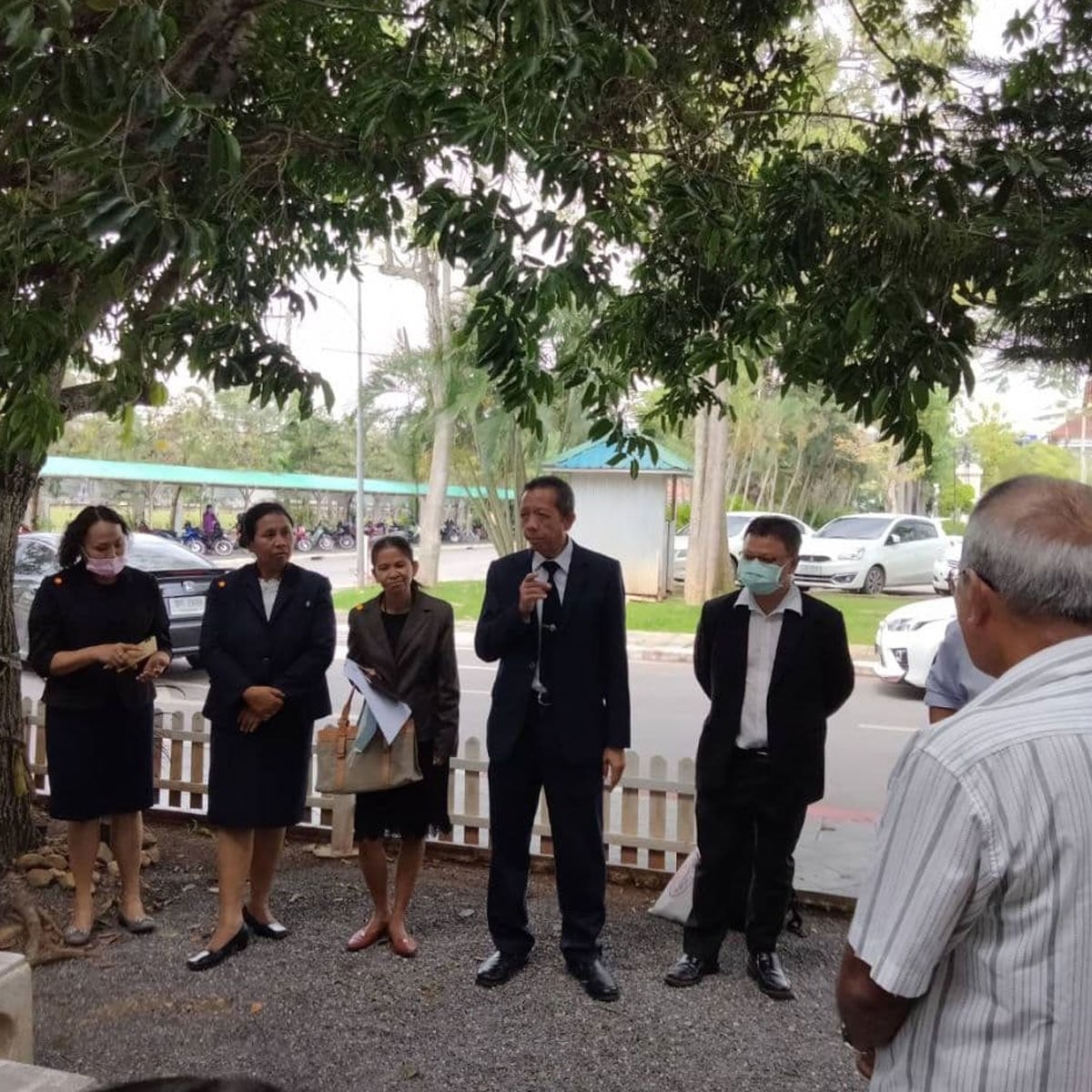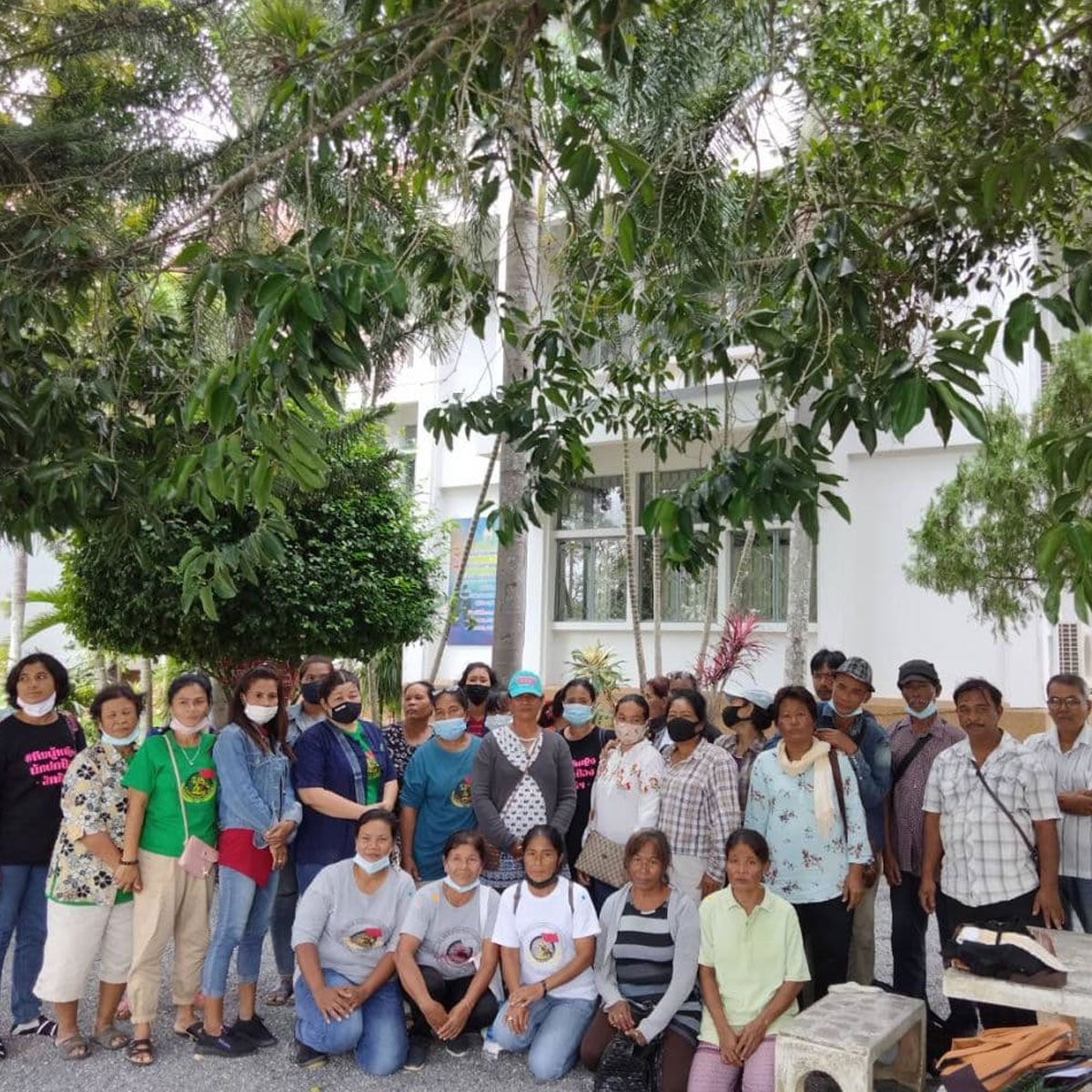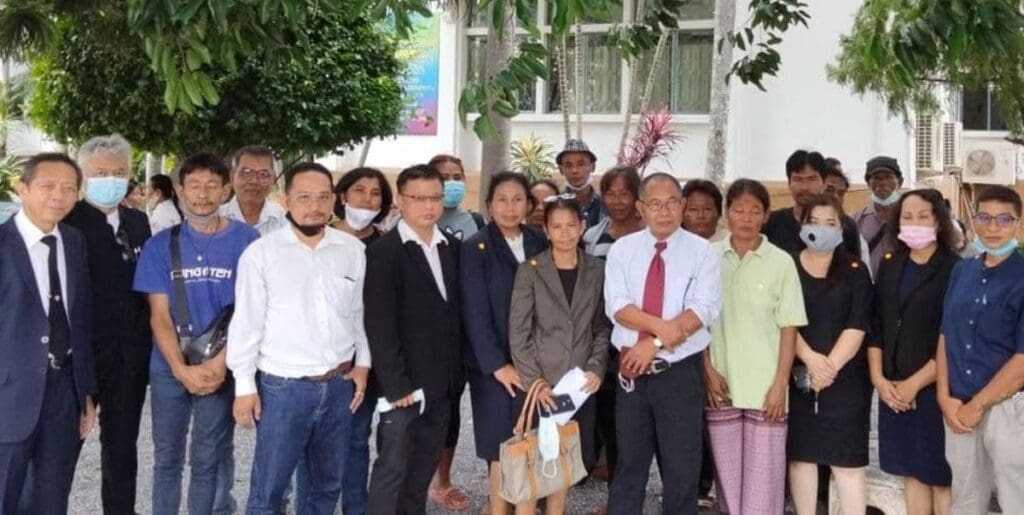Previous investigations revealed this company had illegally occupied the disputed land, but local authorities continue to fail to perform their duties of redistributing it among the landless peasants
[Thailand] On 27 November 2020, the Surat Thani Provincial Court conducted a preliminary hearing on the case of 36 land rights defenders from the Santi Pattana Community, a member of the Southern Peasants’ Federation of Thailand (SPFT) that is struggling against forcible eviction from their land.
The Santi Pattana Community, a collective created by the villagers who escalated their action and occupied the unused land in 2007, started then its legal struggle to defend their right to land. The community adheres to the system of land management based on community land title deeds, which is part of a pilot program that has been endorsed by the Office of the Prime Minister since 2010.
This community’s struggle for land rights started in 2003, when a local private company called the United Palm Oil Industry PLC, claimed to have a so-called NSK3 document – land title deeds – over a plot of land that local villagers had been tilling and, conspiring with local authorities, initiated the process of forcibly evicting people from the land.
“It is a basic human right for a person to have access to residential and farmland. It is incumbent on the State to ensure people enjoy such rights. We cannot let big investors have exclusive access to the land, nor let them have the right to lease such land on a long-term basis with a cheap rental rate,” said Ratsada Manuratsada, a lawyer member of the legal team in this case.

As a way to prevent other communities from facing forcible eviction in similar cases, the SPFT claims to have no relations with 12 defendants who were evicted in 2012 by the Lower Civil Court, who also ordered to have all buildings and properties removed from the land in dispute.
Luckily, in 2016 the Supreme Court overturned the decision made by the Lower Civil Court and confirmed the claims made by the villagers, who insisted that their community was not on land belonging to the company, but rather on land allocated by the Agricultural Land Reform Office (ALRO).
Despite the Supreme Court Decision, which dismissed criminal cases against the villagers and ruled they should be free to stay, United Palm Oil Industry invoked a separate civil court order that is backed up by the NSK3 land title deeds to continue operating on the land.
In July 2020, the company proceeded with a cadastral survey even though the land rights are still being disputed, and they have tried to forcibly evict people from the land. The Santi Pattana Community insists that they will continue to fight for their right to the land through the judicial process.
Manuratsda, also a member of the Lawyers Council of Thailand’s Committee on Human Rights, claims that the Agricultural Land Reform Office (ALRO) has been acting too slowly in the process of redistributing the land to the peasants. This goes against their mandate and the policies set out by the government, which states that they should be responding to these issues promptly. The villagers have been waiting for nearly ten years and, instead of justice, they continue to find themselves in the Courthouse without a resolution. Manuratsada has been representing the Santi Pattana Community in several cases, and the Court has dismissed all of them because the villagers have been living on ALRO land.
Pranom Somwong from Protection International says that another legal case deserving of attention is related to the attempted murder of a land rights defender. On 20 October 2020, an unknown perpetrator broke into the house of Mr. Dam Onmuang, a member of the Santi Pattana Community and a land rights defender, and fired a gunshot at his head. Fortunately, Mr. Dam was able to escape and survive.

On 9 November 2020, a meeting was chaired by Mr. Sutthipong Klaiudom, Deputy Provincial Governor of Surat Thani, to discuss human rights protection for members of the SPFT who have been subjected to fatal intimidation and threats. Those in attendance included representatives from the NHRC and other prominent agencies.
We call on all concerned authorities to promptly act to ensure the safety of SPFT’s members. We insist that they install police red boxes in the community and implement other critical and contextualized protective measures. Lastly, we call on the Thai authorities to investigate and bring to justice the perpetrators involved in the murder of four SPFT members and the assassination attempt of Mr. Dam immediately.
Background
In 2003, United Palm Oil Industry PLC claimed to have a so-called NSK3 document – land title deeds – over a plot of land that local villagers had been tilling. In cahoots with local authorities, the company initiated the process of forcibly evicting people from the land.
In 2006, these local villagers asked the Provincial Governor to set up a committee to review the documents that allegedly conferred the ownership of the land to United Palm Oil. This process revealed that the company owned both legal and illegal land. Armed with this information, the villagers decided to direct their petition to the authorities and demanded that the law be enforced. Since the local authorities refused to act, they complained to the Office of the Prime Minister and other independent and constitutional organizations including the Office of the Ombudsman, the National Human Rights Commission (NHRC), the Rights and Liberties Protection Department, and the Department of Special Investigation under the Ministry of Justice. All the agencies concluded that, from 2009 to 2011, the private company in question had illegally occupied the land. However, despite this information, local authorities continue to fail to perform their duties of redistributing the disputed land among the landless peasants.
On 28 September 2007, the villagers escalated their action by occupying the unused land and founding their community there, later named “Santi Pattana Community”. In 2009, the United Palm Oil Industry sued the villagers for mischief and trespassing on 1,486 rais (237,76 ha) of land. However, the area of land they sued about included 200 rais (32 ha) under the purview of the Agricultural Land Reform Office, 330 rais (52,8 ha) that are part of NSK land title deeds, and over 800 rais (128 ha) classified as an area of permanent forest. During the process of reviewing the right to the land, it was found that the United Palm Oil Industry had occupied it illegally, and the ALRO had filed police complaints against them. Later, the company struck a deal to return the land to ALRO, who should then distribute it among the landless villagers. However, until now the land has yet to be returned to them.
In 2012, the Lower Civil Court ruled to evict the 12 defendants and their representatives and to have all buildings and properties removed from the land in dispute covering an area of 110 rais (17,6 ha). The villagers insisted, however, that their community was situated on ALRO land, not the land belonging to the company, meaning the court order could not be executed. This claim was attested to by the ruling of the Supreme Court in 2016 which dismissed criminal cases against the villagers. The Court ruled that the villagers had indeed settled on ALRO land and they should be free to stay.
Irrespective of the Supreme Court Decision, the United Palm Oil Industry invoked a separate civil court order that is backed up by the NSK3 land title deeds to continue operating on the 110 rais of land. In July 2020, the company proceeded with a cadastral survey even though the land rights are still being disputed, and they have tried to forcibly evict people from the land. The Santi Pattana Community insists, however, that they will continue to fight for their right to the land through the judicial process and following a system of land management based on community land title deeds, which is part of a pilot program that has been endorsed by the Office of the Prime Minister since 2010. Needless to say, the court battles continue. Previously, the land rights defenders also filed a case with the Administrative Court in 2013 asking to revoke the private company’s ownership over the land since its land titles had been acquired unlawfully. In the same suit, the Director General of the Land Department was also accused of abusing his office while the Director General of the Forestry Department was accused of procrastinating the performance of his duties. The Administrative Court has yet to rule in this case.


